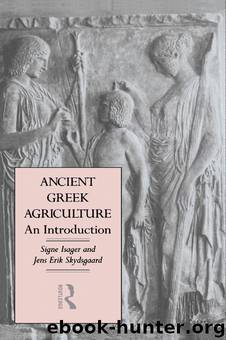Ancient Greek Agriculture by Isager Signe. Skydsgaard Jens Erik

Author:Isager, Signe.,Skydsgaard, Jens Erik.
Language: eng
Format: epub
ISBN: 978-1-134-81826-6
Publisher: Taylor & Francis (CAM)
THE SELF-GROWN CITY
In the ideal states of the philosophers, as in the newly founded colony, there was full agreement between the number of citizens and the number of lots of land. For each set of lots, there was one citizen. This ideal situation could be maintained only provided the number of lots was allowed to remain constant; this would set a limit to the future number of citizens; so, that is what the philosophers did. Plato, in his ideal state number two (where, contrary to his first, he operated with privately owned land), decreed that only one son (one child) should be allowed to inherit the ancestral lot. Were there several sons, they would have to be distributed as adopted sons among households where there was no heir, and girls would have to be married off. Adjustments could be made by the expedient of sending out a colony or, if bad came to worse, by accepting a supplementary contingent of people from the outside (Laws, 739–40). Aristotle, on the other hand, was of the opinion that maintaining the distribution of land, agreed upon once and for all, would be preferable, this being accomplished by laying down legal limitations for how many children you would be allowed to give birth to (Pol. 1265a39–b14, 1335b20–7).
But none of the city-states in real life, which had been in existence for some centuries, could display an ideal agreement of this kind between the number of citizens and lots of land.
The first Athenian was born by Ge (the Earth) in Attica. That is where the Athenians had lived ever since – the city had not been founded by any single act. This is what the Athenians themselves have told us, and they are not likely to have told anything completely incompatible with what they observed round themselves.127 Athens was demonstrably a self-grown city, and there is no reason to believe that even the most refined methods will ever reveal traces of an original division of Attic agricultural land into lots of equal size. Still, everything indicates that there was no major difference in the size of farms in Classical Athens.128 It was a direct consequence of a consistent legislation with regard to citizenship and inheritance.
As we have mentioned (p. 118), particularly reliable sources are available in the speeches written by Isaeus concerning questions of inheritance in Athens, and among recent thorough discussions of the topic we may mention A.R.W. Harrison, The Law of Athens I (1968), and David M. Schaps, Economic Rights of Women in Ancient Greece (1979).
The number of Athenian citizens was fairly constant. By a law from 451 the number was controlled solely on the basis of criteria of birth: to become a citizen you had to have been born into a family consisting of parents who were both Athenian citizens. Sons of a couple of this kind could, once they came of age, be admitted to the list of citizens, while the daughters were the only women who could bear potential citizens and wives of such.
Download
This site does not store any files on its server. We only index and link to content provided by other sites. Please contact the content providers to delete copyright contents if any and email us, we'll remove relevant links or contents immediately.
Learning SQL by Alan Beaulieu(6280)
Weapons of Math Destruction by Cathy O'Neil(6264)
Digital Minimalism by Cal Newport;(5749)
iGen by Jean M. Twenge(5408)
Sapiens by Yuval Noah Harari(5365)
The Age of Surveillance Capitalism by Shoshana Zuboff(4275)
Elon Musk by Ashlee Vance(4121)
Thing Explainer by Randall Munroe(3930)
Apollo 8 by Jeffrey Kluger(3702)
Future Crimes by Marc Goodman(3592)
The Science Book (Big Ideas Simply Explained) by DK(3277)
The Innovators: How a Group of Hackers, Geniuses, and Geeks Created the Digital Revolution by Walter Isaacson(3152)
Who Can You Trust? by Rachel Botsman(3129)
I Live in the Future & Here's How It Works by Nick Bilton(2993)
Infinite Energy Technologies by Finley Eversole(2974)
Steve Jobs by Walter Isaacson(2889)
Dawn of the New Everything by Jaron Lanier(2770)
Chernobyl by Serhii Plokhy(2534)
Ben Franklin's Almanac by Candace Fleming(2522)
